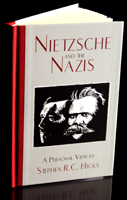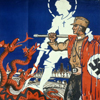[This is Section 32 of Nietzsche and the Nazis.]
32. On Judaism and Christianity: opposite or identical?
 One more key difference between Nietzsche and the Nazis is important, and that is their views on Christianity. Nietzsche consistently states that Judaism and Christianity are allies, both stemming from the same source, both advocating a religious ethic that puts the weak, the sick, and the humble first. As with Judaism, Christian morality is a slave morality.
One more key difference between Nietzsche and the Nazis is important, and that is their views on Christianity. Nietzsche consistently states that Judaism and Christianity are allies, both stemming from the same source, both advocating a religious ethic that puts the weak, the sick, and the humble first. As with Judaism, Christian morality is a slave morality.
Christianity, he writes, is “a rebellion of everything that crawls on the ground against that which has height.”[100]
The Christians, he writes, “did not know how to love their god except by crucifying man.”[101] And for that great crime against humanity, Nietzsche says: “I condemn Christianity. I raise against the Christian church the most terrible of all accusations that any accuser ever uttered. It is to me the highest of all conceivable corruptions.”[102]
So Christianity does not escape Nietzsche’s wrath, just as the slave morality of the Jews did not escape his wrath—and for the same reason: Christianity is an extension and purification of moral themes first developed within Judaism. In Nietzsche’s own words: “In Christianity, all of Judaism … attains its ultimate mastery as the art of lying in a holy manner. The Christian, the ultima ratio of the lie, is the Jew once more—even three times more.”[103]
This identification of Christianity with Judaism also separates Nietzsche from the Nazis, for the Nazis took great pains to distinguish the Jews and the Christians, condemning Judaism and embracing a generic type of Christianity.
Early in the Nazi Party’s history, in its founding document, the 1920 Program, point 24 states the following: “The party, as such, stands for positive Christianity, without, however, allying itself to any particular denomination. It combats the Jewish-materialistic spirit.”
 The use of Christian themes and imagery was prominent in Nazi propaganda throughout the 1920s.
The use of Christian themes and imagery was prominent in Nazi propaganda throughout the 1920s.
In Joseph Goebbels’s semi-autobiographical novel, the main character Michael is portrayed as a hybrid Christ-figure and German martyr. And in a 1935 interview, Goebbels was so concerned to separate Christianity from Judaism that he went as far as to deny that Jesus was a Jew.
Adolf Hitler argued that the Christians and Jews were fundamentally opposed religions[104] and himself sounded Christian moral themes explicitly in public pronouncements such as this one: “When I came to Berlin a few weeks ago … the luxury, the perversion, the iniquity, the wanton display, and the Jewish materialism disgusted me so thoroughly, that I was almost beside myself. I nearly imagined myself to be Jesus Christ when He came to His Father’s temple and found it taken by the money-changers. I can well imagine how He felt when He seized a whip and scourged them out.”[105]
References
[100] A 43.
[101] Z 2: “On Priests.”
[102] A 62.
[103] A 44.
[104] Hitler 1925, 307.
[105] Hitler, quoted in Langer, (viewed July 25, 2006). Hitler also claimed: “By warding off the Jews, I struggle for the work of the Lord” (quoted in Lilla 1997, p. 38).
[Return to the Nietzsche and the Nazis page. Go to the StephenHicks.org main page.]